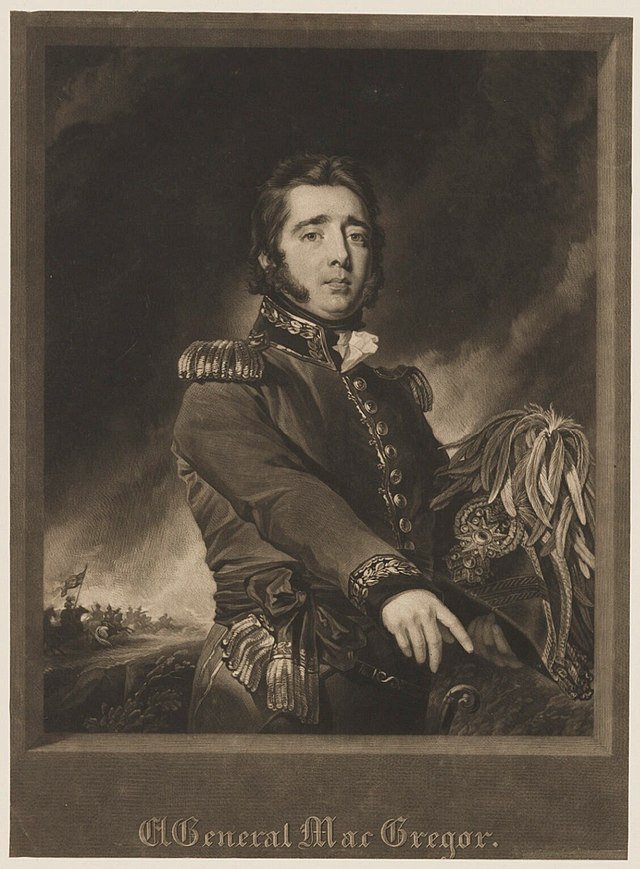The Parable of Poyais, Part III
by Sam Hatt
October 2023
Long Read
Sam Bankman-Fried’s FTX and Elizabeth Holmes' Theranos are but modern-day reincarnations of Cazique MacGregor’s Poyais.
This is Part III of a three-part essay. Read Part I here and Part II here.
Part III: Neo-Poyais
“As a general matter, I don’t lie, it’s something that I believe fairly strongly in.”
While separated by 200 years, these words of the Crypto King Sam Bankman-Fried, written last month in a document titled “Truth”, demonstrate that the animus of Cazique MacGregor is alive and well. In the last few years, Bankman-Fried’s FTX and Elizabeth Holmes' Theranos can surely be seen as modern-day reincarnations of MacGregor’s Poyais.
“Settlers duped into believing in 'land flowing with milk and honey'” read the headline of the Manchester Guardian on October 25th, 1823. While a country could not be so easily invented today, do current conditions leave us more susceptible to such manipulation? With FTX boundless wealth, Theranos enhanced life, and an overabundance of information and instantaneous communication, are such confidence tricks now easier or harder to perpetrate?
It is fascinating to consider how Gregor MacGregor went about inventing all that he did. Did these things occur to him on the spur of the moment, as potential colonists and collaborators asked questions about Poyais, or did he arrive in London having worked through and written down the whole structure? Like all good con artists, MacGregor was a fluent talker with a unique charm, but where others floated fake companies and sold shares in spurious commercial enterprises, he dared to invent an entire country. How much more he would have earned if he had simply repeated his Amelia Island technique with Poyais, offering straightforward scrip against millions of acres for which he could at least have made some sort of legal claim to ownership, and then disappearing, as he had done in Florida?
Unlike Bankman-Fried, Holmes and their ilk, MacGregor’s legacy remained astonishingly untarnished for some time. While the heady highs of other conmen have been tempered with dismal lows, the same cannot be said of MacGregor. While we know he lived out his latter days comfortably with his generous pension as a hero in Caracas, for a long time his reputation remained positive beyond the grave.
There was a lasting effect of all the fabrications MacGregor circulated about his background and his activities. They were still being accepted as fact a quarter of a century after his death, when in 1870 the monumental The Scottish Nation: The Surnames, Families, Literature, Honours and Biographical History of the People of Scotland was published in Edinburgh. Its author, William Anderson, summarised MacGregor's career as follows:
“Sir Gregor MacGregor at one time rendered himself remarkable by his exploits in South America, and particularly by obtaining sovereign sway in Poyais, a fertile tract of land, on the Mosquito Shore, near the Bay of Honduras, with a capital of the same name. He was originally an officer in the British army, and served with distinction in Spain. In 1816 he was very active in the Venezuelan Revolution, and in 1817 he took possession of Amelia Island, on the coast of Florida, then belonging to Spain.
“In 1819 he attacked Porto Bello, which he captured, but was soon after surprised in his bed, and obliged to escape out of a window. Some years subsequently he settled among the Poyais, a warlike race of Indians, who had maintained their independence, and having gained their confidence he was chosen by them as their cacique. In this capacity he encouraged commerce, founded schools, etc. In 1824 as Cacique of Poyais he procured a loan in London from respectable houses. Strangeways, his aide-de-camp, published at Edinburgh in 1822 A Sketch of the Mosquito Shore, including the Territory of Poyais, in which there are many interesting particulars regarding this enterprising member of the house of MacGregor.”
That little tribute might have been written by MacGregor himself—and in a sense, it was. William Anderson had clearly based his research on documents MacGregor had produced to establish his reputation, and to distort the historical record for the purpose of disguising the extent of the fictions he had created. So successful was he that even now the Dictionary of National Biography contains an only slightly more sceptical assessment of him. It notes that he “called himself Cazique of Poyais” and that he was “said to have served” in the British army, attributing to him without comment the knighthood to which he had no entitlement. Of his remarkable confidence trick there is no mention, other than that he “failed in his schemes for colonising the Mosquito Territory.”
That is a remarkably kind epitaph for a cruel fraudster whose lies directly caused the deaths of over 200 people and contributed to the ruination of many hundreds more. Posterity, which often seems a poor judge of character, tends to bestow undue respect on evidence that is available in writing. Too little attention is paid to the reasons why documents were produced and to the personalities and motivations of the people responsible for them. When one reads MacGregor's proclamations, his letters to newspapers, his reports of his military victories, it is not difficult to accept his characterization of himself as a man of honour, integrity and altruism who became the innocent victim of circumstance and betrayal by others. It is only when one reads between the lines, delves into the background, and asks questions that something like the truth emerges.
At a stretch, one could posit that a different Artificial Intelligence existed 200 years ago—that being the complex intermeshing of fact and fiction which MacGregor peddled. While technology has irrevocably altered the nature and power of today’s pervasive (and often incredibly attractive) disinformation, the same remedy must be redoubled: the importance of questioning our own thoughts and beliefs, especially in the echo chamber of online algorithms, which steer our preferences, direct our focus, and can prey on our worst instincts so seamlessly.
Michael Rafter, a contemporary of MacGregor, who wrote a scathing memoir against him, pinpointed this danger, which still seems as relevant today: “The human mind is ever on the rack for novelty, for adventure, for an unquestioned path to prosperity, and however we may see our comrades suffer, there is a principle implanted in our breasts; a feeling of self-love, which inspires us with the hope that we, at least, may be more fortunate...”



